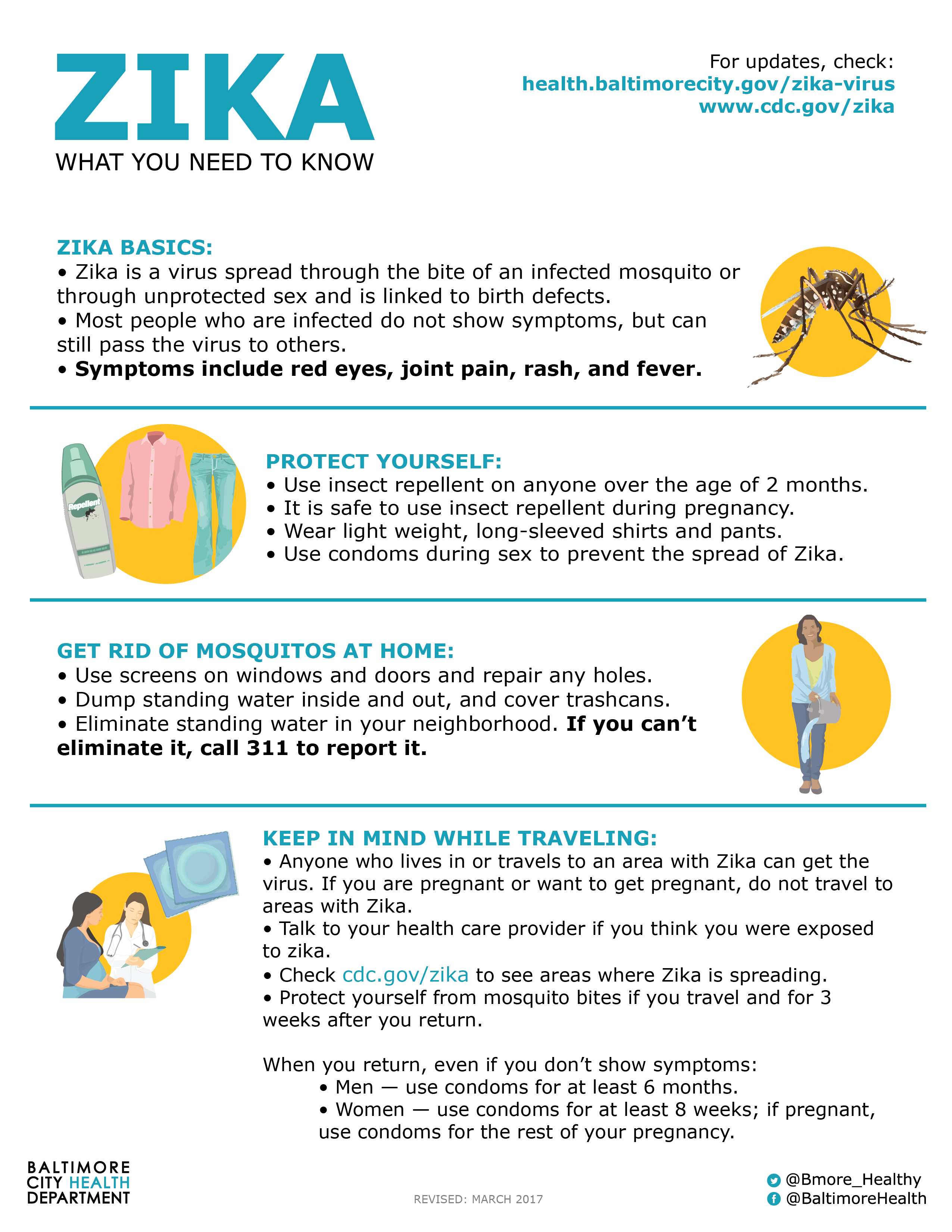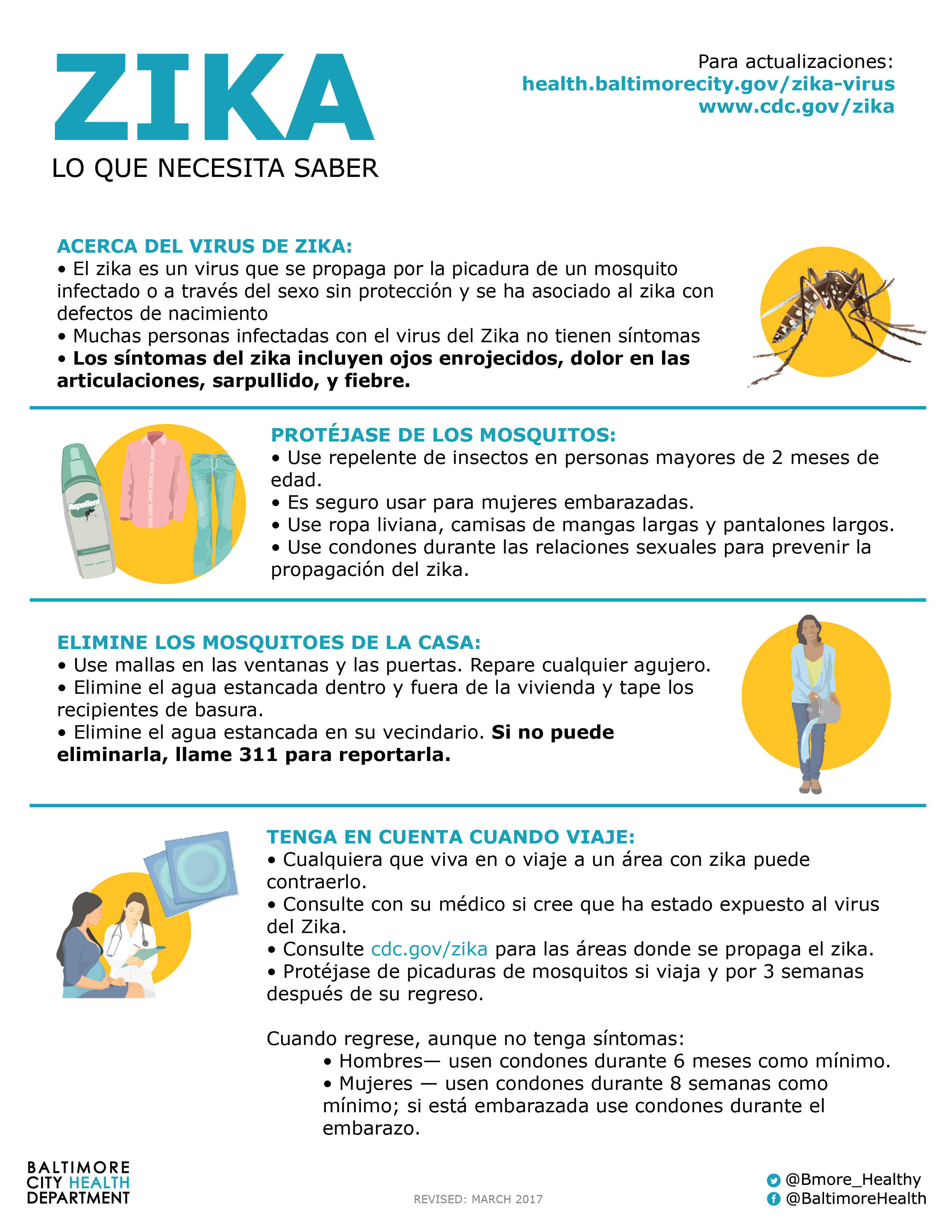Zika Virus
UPDATE: Cumulative Baltimore City Zika Virus Infections (as of October 11, 2017): 24
The Baltimore City Health Department continues to monitor the movement of the virus, particularly among travelers. Zika poses a public health threat, especially to pregnant women. We are working with community partners to educate residents about the Zika virus and sent letters (attachments below) to Baltimore City Clinicians to update them on recent events surrounding Zika Virus and urge them to follow CDC guidelines when seeing patients with a history of travel to an area with ongoing Zika transmission.
The Baltimore City Health Department is closely monitoring and working with our State and Federal partners. For more information visit the CDC website.
What is Zika and why is there so much news about it?
Zika is a disease caused by Zika virus that is spread by mosquito bite. It has existed since 1947 in Africa and Asia but has only been in the Americas since 2007.
Zika infection during pregnancy has been linked to microcephaly, a serious birth defect which causes abnormally small heads and brain damage. In February 2016, the World Health Organization has declared Zika a global public health emergency. It has spread to more than 45 countries, including those in the Caribbean, Central and South Americas, and the Pacific Islands/Oceana.
What are the symptoms of Zika? Is there a treatment or vaccine?
Most people with Zika don’t have symptoms at all. About 1 in 5 people will have symptoms such as fever, rash, joint pain, conjunctivitis (red eyes) or headaches. Most people will have a mild infection, which requires no hospitalization and goes away on its own.
Zika infection during pregnancy has been linked to microcephaly, a serious birth defect.
There is no anti-viral treatment and no vaccine to prevent from getting Zika at this time, though researchers are working hard to develop a vaccine against Zika.
How is Zika transmitted?
Zika is primarily transmitted through the bite of infected Aedes mosquitoes. Aedes mosquitoes become infected when they bite a person already infected with the virus. Infected mosquitoes can then spread the virus to other people through bites.
Zika can also be transmitted through unprotected sex.
Zika cannot be transmitted via casual contact, such as shaking someone’s hand. It can also be transmitted by blood transfusion and from an infected pregnant mother to her baby.

Are there any local mosquito-borne cases in Baltimore?
At the moment, there are no cases of locally acquired mosquito-borne illnesses in Baltimore. There have been multiple confirmed cases of mosquito-borne Zika in Miami-Dade County, Florida, and Brownsville, Texas. As of June 2, 2017, CDC and the Florida Department of Health have lifted the Zika cautionary (yellow) area designation in Miami-Dade county. By doing so, it means there are no longer any travel recommendations related to Zika virus for Miami-Dade County. The CDC has also lifted the cautionary designation for Brownsville, TX on August 29, 2017. This means that there are no longer any travel recommendations related to Zika virus for Brownsville, Texas.
Maryland currently has 230 (172 reported in 2015-2016, and 58 in 2017) travel-associated cases.
There are now about 5,530 travel-associated cases in the U.S. states and D.C.; 225 cases acquired through local mosquito-borne transmission, and 50 cases by other routes, such as sexual transmission, mother-to-baby, and laboratory transmission. There are 37,075 cases reported in the in the territories of American Samoa, Puerto Rico, and the U.S. Virgin Islands.
It is likely that a traveler infected with Zika could return to Baltimore. The Baltimore City Health Department is closely monitoring the situation with our state and federal partners.
Should I worry that I will get Zika?
If you have traveled to an area with Zika virus, or have had unprotected sex with someone who recently traveled, talk to your doctor about your risk for Zika virus infection. An updated list of countries with Zika can be found at http://www.cdc.gov/zika/geo/index.html.
Should I travel?
The Centers for Disease Control and Prevention is asking all pregnant women to consider postponing travel to areas with Zika transmission. If you must travel, talk to your doctor and strictly follow steps to prevent mosquito bites. Women trying to become pregnant should speak with their doctors before traveling.
How can I prevent from getting Zika or from bringing it to Baltimore?
Without an existing cure or vaccine, prevention and preparedness are key to combating the spread of Zika.
Here are four easy, proactive steps that every Baltimore resident can take to protect their communities:
1. Be on the lookout for potential breeding sites for mosquitos.
The type of mosquito that carries Zika, are known as container breeders, needing only the amount of water in a bottle cap to breed. Make sure to:
- Remove any standing water in buckets, coolers, or old tires.
- Cover trash cans and keep recycling bins flipped over,
- Clear your roof gutters, and
- Treat bird baths, ponds, or any outdoor still water with larvicide tablets.
2. Take steps to mosquito-proof your home—or yourself when outside.
Whenever possible, please keep screens on all windows, shutting doors and windows without screens, using air conditioning when possible, and repairing damaged or torn holes in screens.
When outside, use an Environmental Protection Agency (EPA)-registered insect repellent. Residents are also advised to call 311 if they see standing water in their neighborhood for four days or more and cannot find a way to remove it themselves.
3. Take precautions if you or a loved one has recently traveled—or plan to travel—to a country where Zika has been detected.
Those planning to visit Brownsville, Texas, or a country where Zika transmission is active, should make sure to wear insect repellent, light-weight long sleeves, and pants, and treat their clothes with Permethrin. Pregnant women should postpone trips to areas with Zikai until after their pregnancy whenever possible. And women who are planning on becoming pregnant should talk to their healthcare providers before booking tickets.
When returning to Baltimore, use insect repellent for three weeks. This will prevent mosquitoes in Baltimore from biting anyone who may have been infected abroad to help prevent them from spreading the disease to someone else here in the city. All women who travel to an area with Zika should use condoms for 8 weeks after they return, and all men should use condoms for 6 months after they return, regardless of whether they show symptoms or not.
4. Join our Zika Ambassador Program
Our Zika Ambassador Program is being updated for 2017. Please check back soon for information to become an ambassador.
Where do I go for more information?
- Please see our in-depth Q/A here.
- The Baltimore City Health Department will continue to provide updated information in collaboration with our partners. You can regularly visit http://health.baltimorecity.gov/zika-virus for updates or follow us on Twitter at @BMore_Healthy.
- This is a developing situation and guidelines may change. We are working very closely with State and federal officials and recommend that you regularly check the CDC Zika Virus website. The CDC has comprehensive Zika information available at http://www.cdc.gov/zika/.

